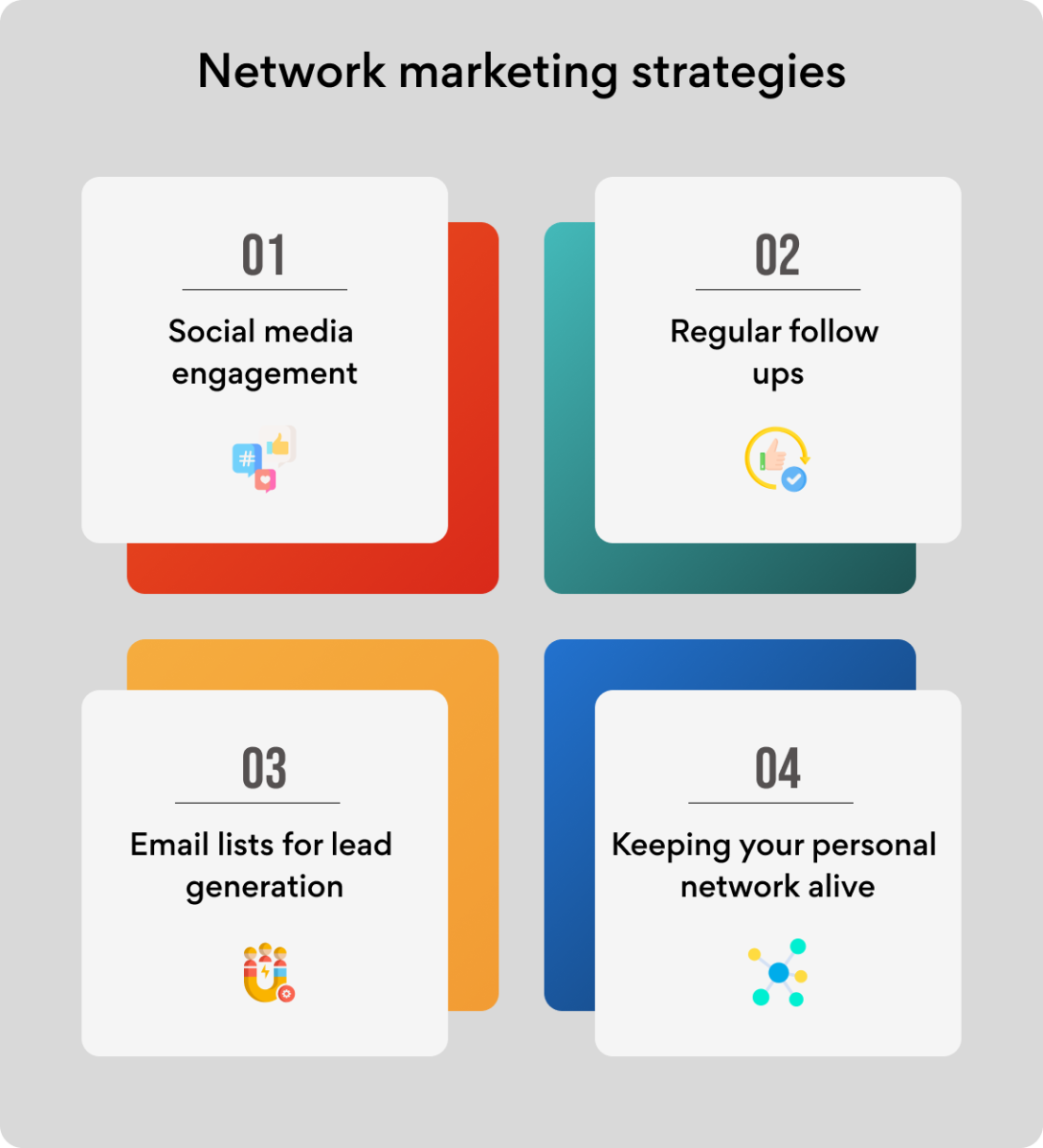Introduction
We are living in a world where entrepreneurship and startups have split the competitive market space between them. The terms ‘affiliate marketing’ and ‘network marketing’ are buzzing around like secret passwords to financial freedom. So, what do they mean? For all you know, they could be two sides of the same coin or two different currencies. A newbie exploring self-employment strategies or a seasoned pro looking to hire him, both need to demystify the nuances and navigate the sometimes murky waters of these popular business models. These are entrepreneurial opportunities from both sides of the table. Understanding the nitty-gritties of affiliate marketing vs network marketing can mean the difference between a gig and a goldmine!
The Direct Sales Generational Engagement Study conducted by DSN found that younger generation prefer affiliate marketing more than older generations. 56% of younger millenials, 42% Gen Z, 40% older millennials, and 38% Gen X consider affiliate marketing to be a better option. With network marketing, the preference range among various generations are millennials at 68%, Gen Z and older millennials at 52% and Gen X at 43%.
Sales strategies are the lifeblood of any successful business. It guides the way companies engage with customers and close deals. Choosing the most feasible of the sales strategies can significantly ramp up a company's bottom line. It is the sales technique that secures sales and builds customer relationships. Here’s a rundown of some popular methods:
An overview of sales strategies
Network marketing and affiliate marketing have a common goal and yet they have different approaches and strategies. With affiliate marketing the affiliate promotes products and services online and gets paid for a lead generated and a sales deal closed. Contrarily, network marketing banks on a network of distributors to make sales. Consequently, their routes are different:
Strategies for affiliate marketing

Identify an affiliate network: This helps in identifying affiliates for companies and vice versa. They also facilitate payment processing, legal protection and communication channels.
Build relationship with the audience: Affiliates have to present themselves as consultants on their chosen products and services. With this approach they have to build relationships with the audience.
Promote products that you especially like: Affiliates should single out products that they particularly like. They would be better able to promote these to a like-minded audience.
Create affiliate programs: The organization looking to market its products through affiliate approach can create region specific programs based on regional events and holidays. The relevance of these occasions helps capture extra sales by targeting the audience when they are uniquely open to products and services.
Network marketing strategies

Social media engagement: This is a very crucial part of network marketing actions. With social media platforms and consistent content posting, you can directly engage with your audience and build a lasting relationship.
Regular follow ups: This exercise can be tough but it is result-oriented. Keeping up with the leads in the sales funnel should be a practice to be done on a daily basis.
Email lists for lead generation: Having an email list at hand is one of the most imperative network marketing actions. It is almost equivalent to connecting directly with your audience.
Keeping your personal network alive: It is very important that your personal network of friends,and family is kept active through regular meetings and communication.
So, when you have to choose between network marketing vs. affiliate marketing, you must distill your focus and actions on what is needed to drive business—accordingly pick, choose and strategize.
Importance of choosing the right sales approach
Several factors decide the sales approach for the product or service to be launched. They are also responsible for deciding the network marketing vs affiliate marketing strategy. The choice will have a bearing on your margins.
- Target audience: Different sales techniques appeal to different segments of the market. Understanding and aligning with your target audience’s preferences can affect the chances of making a sale.
- Product type: Certain products are better suited to specific sales techniques. For instance, digital products, physical products, events and services are best suited for affiliate marketing.
- Cost efficiency: Some sales techniques are more cost-effective than others. For example, online shopping platforms reduce overhead costs compared to door-to-door sales.
- Scalability: Techniques like multi-level marketing help in scaling the business rapidly. A network of sales representatives quickens the reach and movement of the product.
- Customer relationship: Building a robust relationship with the customer can be done with the help of regular communication, maintaining transparency and eliciting feedback.
- Brand image: This is impacted by the sales technique chosen to reach the customer. Direct and personalized sales approaches convey a high level of customer service and quality.
Difference between network marketing and affiliate marketing
To decode the difference between the two business models, a serious analysis of network marketing vs affiliate marketing needs to be done. Let's begin by understanding how they differ in definition.
Network marketing programs present an opportunity to sell a product line directly to friends, family, and other personal contacts. They need a low upfront investment. In case of multiple-layered network marketing programs require participants to recruit other sales representatives. The recruits become a rep's "downline". The sales done by the downline generate income for those above them in the program.
Affiliate marketing is based on the concept that anybody can earn money from anywhere, and anytime—even while asleep. Affiliate marketing is the process by which an associate reaps a commission for marketing another person’s or company’s products online. This secures the affiliate a piece of the profit from each referral. The sales are tracked with an affiliate marketing software via affiliate links from one website to another.
Network marketing vs. affiliate marketing - A comparison
Affiliate marketing and network marketing are both sales approaches and modes of earning income by promoting products or services. Both are trends that have gone viral in the marketing industry. And both work with unsalaried marketers and similar sales funnels, but they have different approaches and goals.
Network marketing is the business approach of an individual wherein personal network is utilized to sell products and services. This sales model does not employ full time sales staff; instead individual sales professionals sell the products. This mostly involves an individual buying products from the parent company and then selling it within a personal network of friends, family and acquaintances.
Affiliate marketing is a very simple, straightforward and transparent way of doing sales. One only needs to launch partnerships with people who appreciate the product and would like to promote it. The commission is only given when the sale is closed and payment made. In short a person who has used a product becomes an online ambassador of the self-same and earns a commission for the services rendered.
| Network Marketing vs Affiliate Marketing: Differences | ||
|---|---|---|
| Aspects | Network Marketing | Affiliate Marketing |
| Definition | Independent sales professionals selling products that they buy from the parent company | A single-tiered sales approach where individuals promote products or services online and earn commissions |
| Business structure | Decentralized | Simple, straightforward, single-tier |
| Earning | Commissions and sales | Commissions only from direct sales |
| Business focus | Both product sales and network expansion | Only product sales |
| Recruitment | Involves recruiting new distributors | No recruitment involved |
| Growth potential | Exponential growth through network expansion | Growth through traffic, leads, conversions and revenue of companies. |
| Sales approach | Via distributor who sells products and recruits others | Through online ambassador promoting products |
| Examples | Amway, Herbalife, Nu Skin | Amazon Associates, ShareASale, Rakuten Advertising |
Benefits and challenges of network marketing and affiliate marketing
Marketing is a dynamic industry. It has had trends that have either disappeared completely or have transformed beyond recognition. In 2023, however, the two trends became the most popular of all models.
Affiliate marketing and network marketing had reached $189 billion at the end of 2021 and showed growth at a CAGR of 6.1% while the affiliate marketing industry was valued at $17 billion.
The two techniques generate a lot of opportunities, respectively. An in-depth understanding of both the benefits and obstacles of affiliate marketing and network marketing is essential for anyone considering either of the business approaches.
Benefits of network marketing
Network marketing offers advantages that can be highly appealing to aspiring entrepreneurs. Once a network is established, ongoing income or residual income gets generated from the sales efforts of others in the network. The prospect of a side income, over and above the earnings from a regular job draws many individuals. This model encourages individuals to build leadership, communication, and sales skills. The community aspect of network marketing fosters a supportive environment. Team members buttress each other’s morale to achieve assigned targets. Network marketing also allows flexibility to individuals to choose their working hours and location. Gradually their sales activity becomes a part of their lifestyle and social circle.
Challenges of network marketing
Network marketing is not completely free of formidable challenges. This sales technique works two ways: It generates income through sales as well as recruiting. The methodology requires continuous recruitment and training to build and maintain a strong network. However, there have been legal issues in the past that make people perceive network marketing with suspicion. So, convincing potential recruits is an uphill task. Most network marketing companies, however, overcome this obstacle with network marketing software with advanced compliance management features.
Discover how we build resilient businesses with advanced MLM functionalities
Network marketers often find it difficult to achieve financial stability. Since, the earnings depend upon the performance of the entire network; earnings are not predictable. Therefore, network marketing demands persistence, and persuasive communication to make a sale, and a strategic approach to overcome –
Industry stigma
The inherent instability of the business model
| Network Marketing: Pros and Cons | |
|---|---|
| Pros | Cons |
| Once a network is established, ongoing income can be generated from the sales efforts of others. | Success depends heavily on continuous recruitment and training to maintain a strong network. |
| Offers the opportunity to earn extra income alongside a regular job. | The industry has a history of legal issues, leading to skepticism and difficulty in convincing potential recruits. |
| Encourages the development of leadership, communication, and sales skills. | Earnings are unpredictable and depend on the performance of the entire network. |
| Fosters a supportive environment where team members help each other achieve goals. | The business model is often perceived with suspicion due to past controversies. |
| Allows individuals to choose their working hours and location, integrating work into their lifestyle. | Success demands persistence, persuasive communication, and a strategic approach to overcome challenges. |
| Sales activities can become a natural part of one’s lifestyle and social circle. | The inherent instability of the network marketing model poses challenges to sustained success. |
Benefits of affiliate marketing
83% of marketers are using affiliate marketing programs to raise brand recognition. And that’s just the tip of the iceberg because the affiliate marketing market is anticipated to register a 'compound annual growth rate of 7.7% between 2023 and 2030.” Affiliate marketing presents several appealing advantages for businesses. An affiliate program operates with minimal ongoing costs. Affiliates do not need an in-house advertising team to create content for them. It is a one-man effort. Costs are performance-based, so the pay-out is only for the sales generated; minimizing financial risk. The traffic induced by affiliates is highly targeted, aligning closely with the ideal customer base. Affiliate programs are flexible and scalable, that allow adjustment and growth without much expense.
Challenges of affiliate marketing
Affiliate marketing is often misinterpreted for a quick path to easy money. However, the reality is more complex. Being successful demands careful selection of programs, understanding modern tools, understanding partnership terms like commission rates and cookie durations and maintaining brand consistency. There are over 11,400 programs in the U.S. alone. Choosing the right one is almost akin to looking for a needle in a haystack.
Mastering the necessary technology can be a roadblock. It is essential to be conversant with WordPress plugins and AI tools. The learning curve is steep and requires consistent practice. Building a loyal following is critical. It starts with finding a niche and creating profitable content. Tracking and compliance adds to the complexity. Accurate attribution is crucial for earning commissions, but the multi-channel nature of digital marketing complicates this task. Adhering to regulations like FTC guidelines is necessary and time-consuming. Finally, performance in affiliate marketing is unpredictable. Seasonal trends, market changes, and consumer behavior all influence results, requiring adaptability to sustain success.
| Affiliate Marketing: Pros and Cons | |
|---|---|
| Pros | Cons |
| Requires minimal upfront investment compared to other business models. | Success relies heavily on affiliates who may not always align with your brand values. |
| Easily scalable without significant additional costs, allowing for business growth. | The market is saturated, making it challenging to stand out and attract top affiliates. |
| Encourages the development of leadership, communication, and sales skills. | Requires adherence to various regulations (e.g., FTC guidelines), which can be time-consuming and legally complex. |
| Offers flexibility in choosing and managing affiliates, enabling dynamic marketing strategies. | Sales and revenue can fluctuate due to market conditions, seasonal trends, and consumer behavior. |
| Affiliates handle content creation, reducing the need for a large internal marketing team. | Difficult to ensure that all affiliates represent your brand consistently and appropriately. |
| Payment is tied to actual performance, lowering the risk of overspending on ineffective marketing. | Requires ongoing management and communication with affiliates, which can be time-intensive. |
Are network marketing and affiliate marketing risky as a business model?
"The primary risk in network marketing is the inherent design of the business model, which requires perpetual recruitment of new participants," says Robert FitzPatrick, a noted MLM critic.
Network marketing and affiliate marketing are popular marketing approaches and ways to earn income through promotion of products or services. However, it is important to understand the risks involved when considering these as business ventures.
Network marketing entails selling products and recruiting others to do the same. The model offers an opportunity for self-employment and earning significant income; but it can be risky. Revenue is largely dependent on recruiting a strong network and continuously expanding the network. The pressure to recruit can lead to a saturation point, resulting in a stalled growth and slumped income.
Affiliate marketing, as compared, is a simpler and more transparent business model. Here, marketers can earn commission by promoting a product and generating sales through their created content. The risk is relatively lower as there is no recruitment involved. Remunerations and payoffs are solely based on successful sales. However, the competition is fierce, and building a steady income stream requires effective marketing strategies that drive traffic to the product. Unlike network marketing, profitability from affiliate marketing is directly tied to individual effort rather than the performance of a team.
Although both network marketing and affiliate marketing carry risks, the nature and extent of those risks differ. Network marketing comes with the pressure of constant recruitment and the risk of market saturation. Affiliate marketing, while less risky, demands consistent effort and skill in driving sales to generate income.
Conclusion
Deciding upon the course of entrepreneurship involves a comprehensive study of investments—personal and financial. One has to investigate network marketing vs affiliate marketing thoroughly. It is most advisable to be up on compensation structures and focus on genuine product sales over recruitment or sales. For individuals, diversifying their income streams and setting achievable financial goals would be prudent. For businesses, having an in-house sales team coupled with affiliate marketing or a network team could give them the solidity that having only one of them would not. Either way, knowledge and realistic expectations are a must to tread a path to success.









Leave your comment
Fill up and remark your valuable comment.